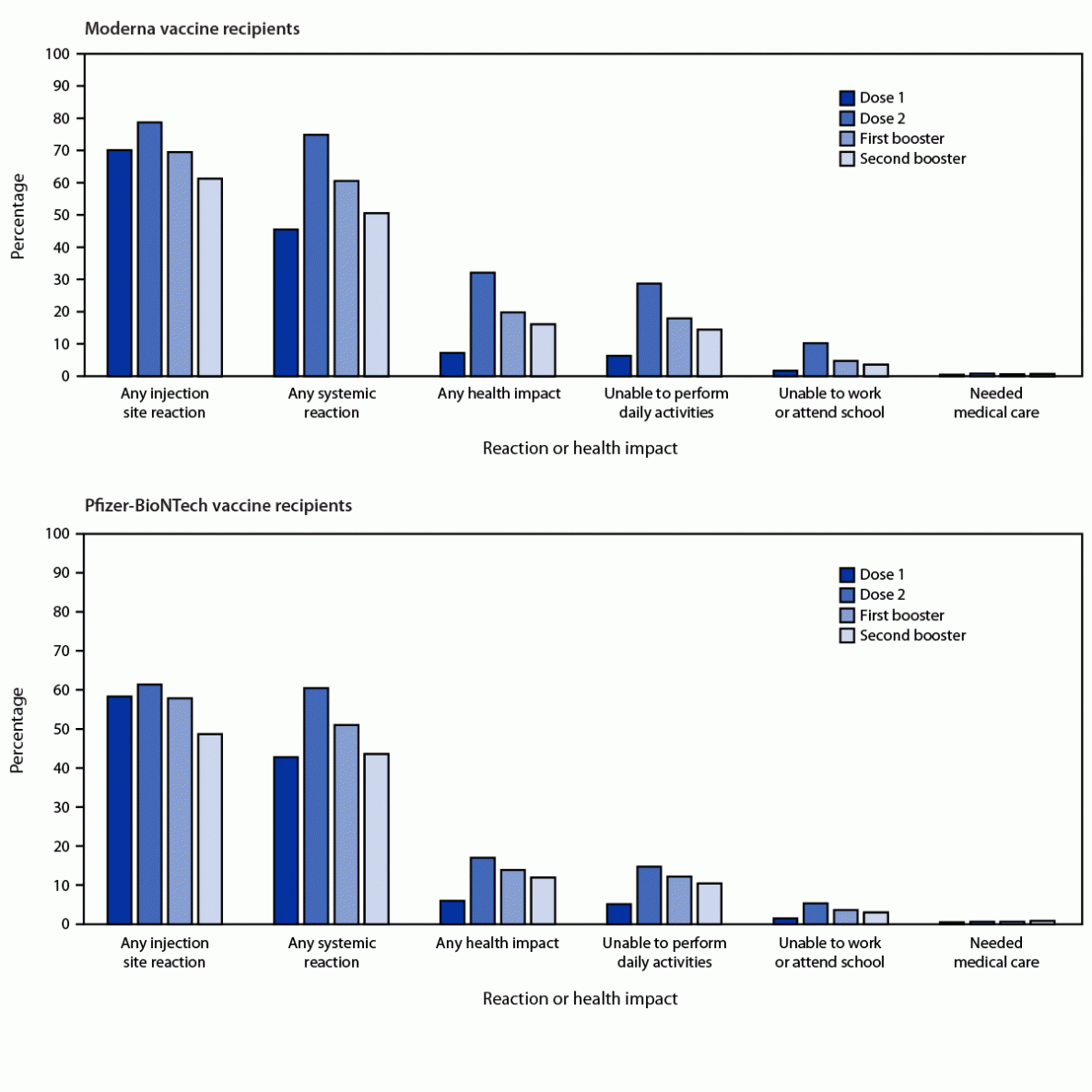The CDC COVID-19 Emergency Response Team recently conducted a study to investigate the safety profile of a fourth dose, otherwise referred to as a second booster dose, of messenger ribonucleic acid (mRNA)-based coronavirus disease 2019 (COVID-19) vaccines in people aged 50 years and older.
Background
According to the Advisory Committee on Immunization Practices (ACIP) guidelines, U.S. residents aged five years and above are recommended to receive a COVID-19 vaccine booster dose after completion of the two-dose primary vaccine series.
Subsequently, the U.S. Food and Drug Administration (FDA) approved a second mRNA booster dose for adults aged 50 years and above, as well as for immunocompromised individuals aged 12 years and older, four months after receiving a first booster dose.
Study design
The safety profile of the second mRNA booster dose was assessed by reviewing second booster vaccination-related adverse events and health issues that were reported to v-safe and the Vaccine Adverse Event Reporting System (VAERS).
V-safe is a smartphone-based voluntary active surveillance system in the U.S. that monitors COVID-19 vaccine-related adverse events. Comparatively, the VAERS is a CDC- and FDA-controlled passive surveillance system used to monitor vaccination-related adverse events.
Approximately 16.8 million U.S. residents aged 50 years and older received a second booster vaccine dose between March and July 2022. The current safety analysis included individuals who received homologous or heterologous mRNA vaccination with the Pfizer and Moderna COVID-19 vaccines.
Analysis of v-safe data
In v-safe, a total of 286,380 individuals aged 50 years and above reported receiving a homologous or heterologous second mRNA-based booster dose.
Regarding local adverse events, 49% of Pfizer vaccine recipients and 62% of Moderna vaccine recipients reported injection site reactions. Systemic adverse events were reported by 44% and 51% of Pfizer and Moderna vaccine recipients, respectively. Both local and systemic reactions were mild to moderate in intensity and most frequently reported the day after vaccination.

FIGURE. Adverse reactions and health impacts* reported by adults aged ≥50 years who received COVID-19 vaccine booster,† by dose — v-safe data, United States, March 29–July 10, 2022§
In the week after receiving the second mRNA booster dose, about 10% and 15% of Pfizer and Moderna vaccine recipients reported an inability to perform normal daily activities, respectively. Moreover, about 3% and 4% of Pfizer and Moderna vaccine recipients reported an inability to work or attend school, respectively.
About 0.8% and 0.7% of Pfizer and Moderna vaccine recipients reported receiving medical care through telehealth or direct clinic visits, respectively. Of all second booster recipients, only 0.03% reported hospitalization, with most individuals indicating that their hospitalization was not due to vaccination.
Of all v-safe registrants, about 87% reported receipt of a homologous second mRNA booster vaccination. Among these individuals, local and systemic effects, as well as an inability to perform daily activities, workplace activities, or attend school, were less frequently observed after a homologous second mRNA booster dose as compared to that after any previous vaccine doses.
However, the requirement of medical care was reported more frequently after homologous Pfizer and Moderna second booster vaccination as compared to that after their first booster vaccination.
Analysis of VAERS data
The VAERS data included a total of 8,515 reports on second mRNA booster vaccination-related adverse events in individuals aged 50 years and older. About 95% of these reports were about nonserious events, including vaccination errors, COVID-19 diagnosis, as well as local and systemic adverse reactions.
The most commonly reported local and systemic effects after vaccination included fatigue, headache, and fever. Among reports mentioning vaccination errors, such as improper vaccine storage or administration of an expired vaccine, about 13% also included information on adverse health issues, such as COVID-19, injection site pain, and fever.
Overall, the VAERS data included 12 reports of myocarditis after receipt of the second mRNA booster dose. Among 442 serious events reported in VAERS, 52 were death reports and 84 were COVID-19 diagnosis reports.
The cause of death was mentioned in six reports and included congestive heart failure, aortic dissection, grand mal seizure, end-stage dementia, and cardiac arrest secondary to coronary artery disease.
Study significance
The findings of the current CDC report demonstrate that second mRNA booster vaccination in adults aged 50 years and older is not associated with any unexpected adverse events and health issues.
According to the available literature, the efficacy of second booster vaccination against COVID-19-related hospitalization is 80% among adults aged 50 years and above. Given the high vaccine efficacy, both the CDC and FDA recommend that all eligible individuals receive a second booster dose.
Journal reference:
- Hause, A. M., Baggs, J., Marquez, P., et al. (2022). Safety Monitoring of COVID-19 mRNA Vaccine Second Booster Doses Among Adults Aged ≥50 Years — United States, March 29, 2022–July 10, 2022. Morbidity and Mortality Weekly Report. doi:1015585/mmwr.mm7130a4.